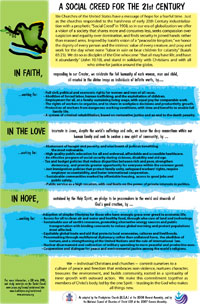
The argument of this issue, in short, is this: All though we might think of ecumenical as something separate and formal, we actually live it all the time. Perhaps it’s time our thinking caught up to our usual practice.
The French playwright Moliere may in fact have best captured this sentiment long ago in the following joke from Act 3 of his 1670 play, The Bourgeois Gentleman (1670):
MONSIEUR JOURDAIN: …I must confide in you. I’m in love with a lady of great quality, and I wish that you would help me write something to her in a little note that I will let fall at her feet.
PHILOSOPHY MASTER: Very well.
MONSIEUR JOURDAIN: That will be gallant, yes?
PHILOSOPHY MASTER: Without doubt. Is it verse that you wish to write her?
MONSIEUR JOURDAIN: No, no. No verse.
PHILOSOPHY MASTER: Do you want only prose?
MONSIEUR JOURDAIN: No, I don’t want either prose or verse.
PHILOSOPHY MASTER: It must be one or the other.
MONSIEUR JOURDAIN: Why?
PHILOSOPHY MASTER: Because, sir, there is no other way to express oneself than with prose or verse.
MONSIEUR JOURDAIN: There is nothing but prose or verse?
PHILOSOPHY MASTER: No, sir, everything that is not prose is verse, and everything that is not verse is prose.
MONSIEUR JOURDAIN: And when one speaks, what is that then?
PHILOSOPHY MASTER: Prose.
MONSIEUR JOURDAIN: What! When I say, “Nicole, bring me my slippers, and give me my nightcap,” that’s prose?
PHILOSOPHY MASTER: Yes, Sir.
MONSIEUR JOURDAIN: By my faith! For more than forty years I have been speaking prose without knowing anything about it, and I am much obliged to you for having taught me that. I would like then to put into a note to her: “Beautiful marchioness, your lovely eyes make me die of love,” but I want that put in a gallant manner and be nicely turned. [1]
___________________________________________
About one third of the members of mainline Protestant churches have been members of other denominations in their lifetimes.
___________________________________________
Estimate that about one third of the members of mainline Protestant churches have been members of other denominations in their lifetimes. Many Christians move more or less freely among denominations, and many pastors and congregations cooperate with other denominations in local contexts without hesitation. And yet the ecumenical movement, from the World Student Christian Federation to National and World Councils of Churches, at times seems to be almost beached. That symbolic ecumenical boat with the cross mast may not be getting as much support as denominations focus on internal issues, but even if we are not talking about those venerable Councils, are we not speaking ecumenese in much of our everyday planning?
 The ecumenical movement—is it not partly the religious side of the wave of globalization that began in the late 19th Century, especially in this land that has been described as a ‘melting pot?’ I think that the mutual recognition and vision that inspired ecumenical cooperation did require a clear differentiation as we emerged from our denominational worlds, with their particular denominational languages (now seen mainly in our orders of worship). Our ecumenical structures may still assume denominational distinctiveness that is now largely lost to a pragmatic local ecumenism. Distinctive traditions and practices are often goods worth keeping— and may not contradict an ecumenical realism committed to the overall Christian witness in our culture. This is to see ecumenism as a commitment to mutual support among all the Christian communions, both in practical cooperation and respect for each other’s traditions.
The ecumenical movement—is it not partly the religious side of the wave of globalization that began in the late 19th Century, especially in this land that has been described as a ‘melting pot?’ I think that the mutual recognition and vision that inspired ecumenical cooperation did require a clear differentiation as we emerged from our denominational worlds, with their particular denominational languages (now seen mainly in our orders of worship). Our ecumenical structures may still assume denominational distinctiveness that is now largely lost to a pragmatic local ecumenism. Distinctive traditions and practices are often goods worth keeping— and may not contradict an ecumenical realism committed to the overall Christian witness in our culture. This is to see ecumenism as a commitment to mutual support among all the Christian communions, both in practical cooperation and respect for each other’s traditions.
Yet, despite homogenizing trends, it may be that in denominational headquarters across the United States, as perhaps in the Roman Catholic and Orthodox Churches, strategies are in place to emphasize the distinctives of one’s own heritage. In purest form, this means recognizing only one’s own form of communion as the highest and not taking communion with others. Institutionally, building up one’s own may make sense: for any belief to endure, it needs organization, loyalty, tradition, identity, and so on. But just as Christianity grew in its earliest days by translating itself into the vernacular, so now is the vernacular, the prose, not ecumenical?
___________________________________________
The civil rights movement, the anti-Vietnam war movement, women’s ordination efforts, the environmental movement of the 1970s…the nuclear freeze movement—all were powered partly by the cooperative side of ecumenism.
___________________________________________
 This is not to deny or forget particular pieces of ecumenical poetry—the Social Creeds of 1908 and 2008, or documents like Baptism, Eucharist, and Ministry (BEM), which so helped the self-understanding of many of our denominations. There are books of powerful essays by some of the best theologians of the 20th century who shared their thinking freely to help the one church find its voice in the face of two World Wars, the rise of Communism, and other social crises (Man’s Disorder and God’s Design, to name one). The civil rights movement, the anti-Vietnam war movement (Clergy and Laity Concerned), women’s ordination efforts, the environmental movement of the 1970s focused on nuclear power, and then the nuclear freeze movement—all were powered partly by the cooperative side of ecumenism. As we will see in Barry Ensign-George’s article, the sociologist David Hollinger argues that the ecumenical movement succeeded, even if the churches most invested in it have lost members in the last 30 years.
This is not to deny or forget particular pieces of ecumenical poetry—the Social Creeds of 1908 and 2008, or documents like Baptism, Eucharist, and Ministry (BEM), which so helped the self-understanding of many of our denominations. There are books of powerful essays by some of the best theologians of the 20th century who shared their thinking freely to help the one church find its voice in the face of two World Wars, the rise of Communism, and other social crises (Man’s Disorder and God’s Design, to name one). The civil rights movement, the anti-Vietnam war movement (Clergy and Laity Concerned), women’s ordination efforts, the environmental movement of the 1970s focused on nuclear power, and then the nuclear freeze movement—all were powered partly by the cooperative side of ecumenism. As we will see in Barry Ensign-George’s article, the sociologist David Hollinger argues that the ecumenical movement succeeded, even if the churches most invested in it have lost members in the last 30 years.
So there is still a value in the intentional language of the ecumenical framework: Is this not a good time to bring the big picture of Christianity in the US and world to mind? Is the call to unity in Christ, often expressed in Jesus’ high priestly prayer that “they all be one” (John 17:11), not still a basic prayer of all Christians? And are there not countless communities in the US where congregations are struggling with critical mass, where the ecumenical question is one of survival for any ‘mainline’ presence? But this third question brings us back to the prose reality of ecumenism.
Unbound is supported by the Presbyterian Church (U.S.A.), but its authors and readers come from a wider community of Christians, including many who may not feel bound by traditional brands. It is my understanding that for some in the millennial generation, even to invoke denominational loyalties is a stumbling block. Theologian Linda Mercadante’s popular book title comes to mind: Belief without Borders. Protestant individualism has now gone much further afield than so-called ‘cafeteria Catholicism,’ so that people easily pick and choose among elements from more than one tradition.
___________________________________________
Is ecumenism still a movement?
___________________________________________
So are denominations done? Or, rather than the ecumenical organizations that appear weaker, are the denominations that used to fund them in fact the species more in jeopardy? Perhaps both need great revisioning; denominations in fact remain the framework for most of the trained ministry in most places. Belief without community, and even communities without nurturing structure, seem unlikely to carry forward the Christian faith and its distinctive values and internal culture.
 So the articles in this issue raise questions: what are enduring ecumenical practices? Should there be new ones? What about cooperation among denominations? What does Full Communion actually mean? Did ecumenism become too institutionalized—or too linked to social justice activism? Either way, is it still a movement? Or is ecumenism a perennial search for Christian essentials, including a shared voice of Christian conscience? How other than through ecumenism does a particular church see beyond its limits of race, class, and nation? What does it mean that churches are seeking more inclusive names, like “All souls,” or “Sojourner Church” (a Southern Baptist spin-off), to make a broader appeal? Has US Christianity benefited numerically from its diversity and competition, or has it also gained numbers and influence because it has had an ecumenical pole of shared commitments?
So the articles in this issue raise questions: what are enduring ecumenical practices? Should there be new ones? What about cooperation among denominations? What does Full Communion actually mean? Did ecumenism become too institutionalized—or too linked to social justice activism? Either way, is it still a movement? Or is ecumenism a perennial search for Christian essentials, including a shared voice of Christian conscience? How other than through ecumenism does a particular church see beyond its limits of race, class, and nation? What does it mean that churches are seeking more inclusive names, like “All souls,” or “Sojourner Church” (a Southern Baptist spin-off), to make a broader appeal? Has US Christianity benefited numerically from its diversity and competition, or has it also gained numbers and influence because it has had an ecumenical pole of shared commitments?
Unbound is a place for both conversation and challenge. If the Spirit is suggesting to you some new ideas – or a return to some older ideas – we welcome your voice.
A few months ago, over 700 Presbyterians participated in a conference called “Big Tent” and Unbound examined some of its theme, the idea of ‘living missionally.’ Whether that category is adequate to frame the calling of Christians in the world, we believe that the fullness of Christ also has a dimension of solidarity and shared identity. So in a sense we are asking, what does it mean to ‘live ecumenically?’ Is the one Church born of the Word of God not a Big Tent that welcomes strangers and makes them pilgrims? And is the whole Church not on a pilgrimage toward the wholeness of God’s reign?
___________________________________________
[1] The Middle Class Gentleman (Le Bourgeois Gentilhomme) by MOLIÈRE (Jean-Baptiste Poquelin, 1622-1673) Translated by Philip Dwight Jones http://www.gutenberg.org/files/2992/2992-h/2992-h.htm).





Unbound Social